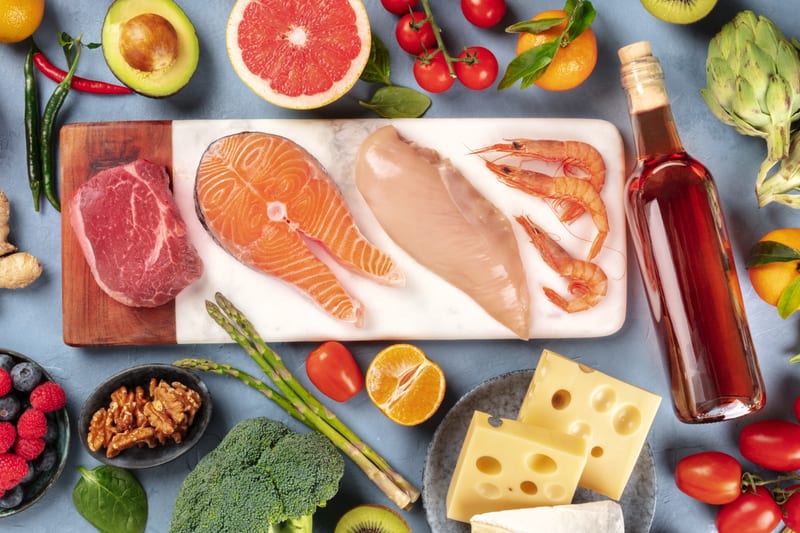Protein: What You Need to Know About the Most Important Macronutrient
- By Yelena B
- No Comments
Nutrients are substances important for growth, metabolism, and other body functions. Macronutrients are nutrients that provide calories or energy. The prefix “macro-” comes from the ancient Greek makros, meaning “large,” since macronutrients essential to life and health must be present in the diet in large quantities. There are three main classes of macronutrients: proteins, carbohydrates, and fats.
If you’ve already started your journey to eating right, you probably hear a lot about the importance of proteins in your diet. Personally, I consider it the most important nutrient for a healthy body. In this post, we’ll look at why protein is so important in a healthy diet and how to consume it to maximize the benefits for your body.
Functions of Protein and Amino Acids
Proteins belong to the essential substances. Without protein, life, growth and development of the human body are impossible. Proteins are the basis of our internal organs, muscles, skin, tendons and ligaments, hair and nails. Together they protect and structure the various molecules necessary for the normal functioning of the entire body.
In addition to providing energy, protein is needed for many other functions: growth (especially in children, adolescents and pregnant women), tissue repair, immune system function, production of hormones and enzymes, building muscle mass and maintaining tendons.
During digestion, the body breaks down the proteins in food into amino acids. The body then uses these amino acids to build proteins by analyzing the information contained in the DNA of each cell.
Transportation Function
Proteins carry chemical elements to cells and back to the outside environment. For example, hemoglobin carries a substance called heme, which is made up of iron bound by oxygen. Hemoglobin is found in the red blood cell, the erythrocyte. To understand the size of a hemoglobin protein molecule, you can imagine that there are 280 million hemoglobin molecules in one erythrocyte!
Motor or Contractile Function
Protein helps muscles to contract.
Structural Function
Provide strength to tissues and cellular structures. Example: The protein collagen builds a strong structure to maintain the shape of tissues
Building Function
Proteins are involved in the formation and growth of tissues, membranes, cell walls, make up muscles, hair, nails, tendons
Signaling Function
Proteins transmit information between cells, tissues, organs
Enzymatic or Catalytic Function
Most enzymes in animals and humans are of protein origin (they speed up or slow down reactions). For example, alpha-amylase is found in saliva and starts the process of breaking down carbohydrates right in the mouth
Regulatory or Hormonal Function
Protein hormones control and regulate metabolic processes. For example, the protein insulin helps the glucose molecule to enter the cell
Informative Function
Proteins regulate the function of nucleic acids in carrying genetic information
Energy Function
Used as an additional source of energy. The breakdown of 1g of protein produces 17.6kJ or 4 kcal
Protection Function
Specific proteins – antibodies – protect the body from infection by destroying foreign particles. Specific proteins clot the blood, stopping bleeding
Complete And Incomplete Proteins
Complete proteins are proteins that contain all 20 amino acids. If some amino acids are missing, it is an incomplete protein.
The most complete foods are those that contain all amino acids in a certain ratio that approximates human protein.
Most of the amino acids the human body can synthesize on its own, but there are several amino acids that the body can not synthesize – these are essential. We must get enough of them from food. There are 20 amino acids in the composition of any protein: 11 amino acids are considered substitutable, they can be synthesized in the body. 9 amino acids are essential (valine, leucine, isoleucine, threonine, methionine, phenylalanine, tryptophan, lysine, histidine) – and must come from outside. The body must necessarily get them from food or supplements
How Much Protein Should You Eat Per Day
The body’s protein requirements vary with age, physical activity, health status, pregnancy and lactation, and stressors.
The World Health Organization (WHO) sets a Safe Protein Intake Level of 0.83 grams per day per kilogram of body weight – this is the minimum amount needed to avoid getting sick, not a specific amount you should eat each day.
Protein intake levels change significantly for children under a year old, pregnant and breastfeeding women, and athletes. Also, people with various diseases accompanied by impaired intestinal absorption and various injuries need an increased amount of protein. But people with kidney failure are recommended a diet with reduced protein content, because the body is not able to metabolize it.
Recommended protein intakes are set by individual countries, unions and non-governmental organizations, so these values may vary slightly. The following are the recommended protein intakes from the International Protein Board (IPB):
0.8 – 0.85 g/kg: Minimum protein intake. Too low intake for weight loss, exercise and sports, illness, etc.
0.94 – 1.07 g/kg: Recommended for people over 70 years of age.
1.1-1.4 g/kg: Supports body systems for adult health and wellness
1.4-1.6 g/kg: Recommended for people in the process of losing weight. Minimizes body protein loss during weight loss, helps control feelings of hunger and support metabolism.
1.4-1.8 g/kg: Recommended amount of protein for people with physical activity and fitness. Helps to increase muscle protein production and balance, increase strength and endurance during exercise.
1.4-1.75 g/kg: Recommended protein intake for the elderly. Compensates for the body’s loss of protein with age and compensates for decreased efficiency of protein supplementation.
1.8-2.2 g/kg: Recommended for improving athletic performance and building muscle mass. Recommended for athletes during sports competitions.
Protein for weight loss is necessary because the body uses much more energy to digest protein than it does to digest fats and carbohydrates.
Products Rich In Animal Protein
- Fish (tuna, anchovies, trout, tilapia)
- Seafood (octopus, lobster, shrimp)
- Low-fat cottage cheese
- Greek yogurt
- Cheese
- Eggs
- Chicken breast
- Turkey
- Lean beef
- Milk
Products Rich In Plant Protein
- Beans, peas
- Lentils
- Nuts (almonds, walnuts, pistachios, cashews)
- Oat flakes
- Whole grains
- Tofu
- Soybeans
- Quinoa
- Nut butters (peanut butter)
- Seeds (hemp seeds, pumpkin seeds)




Leave a reply